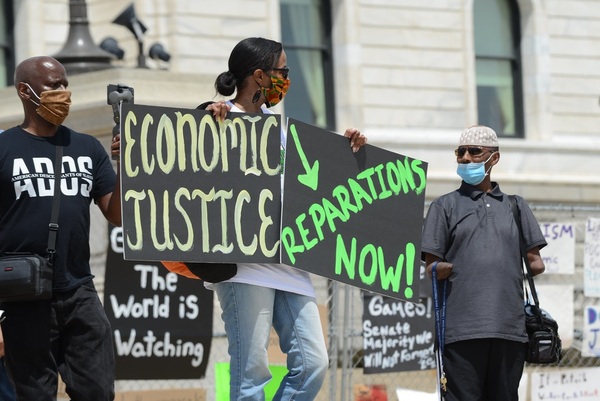
–>
April 4, 2023
Lisa Holder, a member of the California Reparations Task Force, has published an opinion piece in which she hinted at the recommendations that will be made public on July 1st, 2023. We do not yet know the details, but what has been made publicly known indicates the full destructive impact that any new law might have.
‘); googletag.cmd.push(function () { googletag.display(‘div-gpt-ad-1609268089992-0’); }); }
The Task Force is considering a payment of $360,000 each to 1.8 million black people in California. The total cost would be $640 billion. (California’s total budget this year is only $286 billion — a number with which the Task Force is apparently unconcerned.) Undoubtedly, many Republicans will argue that the proposal is “too high.” This argument will dominate the public debate, as it is the only anti-reparations argument that the national media will allow to break through the usual cloud of disinformation. The result of such a debate will be a lower number (also unaffordable) that might be enacted as a compromise.
Try to imagine a number that would be affordable — either for California or the U.S. as a whole since the federal government is the ultimate source of payment. The U.S. is over 30 trillion dollars in debt. To make this proposal affordable, the payments would have to be reversed. Instead of receiving money, the 1.8 million black people contemplated in California would have to pay to the U.S. government $360,000 per person per year for the next 50 years. That would result in enough money to pay off the current U.S. debt. Of course, that will not happen and the U.S. debt will never be repaid. But it serves as a reminder that any amount of reparations would be too much. There is no acceptable compromise.
Even worse, the reparationists do not call simply for a one-time payment. The opinion piece demands legislative action similar to the Great Society programs of Medicare and Medicaid. Those programs have never gone away. They are now called “entitlement” programs. The final “compromise” may well include monthly payments that also never stop. Today’s politicians are routinely falsely accused of voting to “cut Social Security.” The accusation strikes fear into most politicians. Reform is impossible. Future politicians similarly will be accused (usually falsely) of trying to “cut reparations” — resulting in the same paralyzing fear.
‘); googletag.cmd.push(function () { googletag.display(‘div-gpt-ad-1609270365559-0’); }); }
The reparationists also define victims much more broadly than mere slaves or their descendants. The opinion piece calls for “monetary compensation to Black people who are descendants of enslaved and persecuted Black Americans.” The addition of “and persecuted” to the formula means that anyone can be entitled to reparations. Anyone that has ever been arrested, imprisoned, undereducated, evicted, unemployed or a host of other conditions can and will be considered “persecuted.” The program will address “all of the atrocities the government committed against Black people in California.” That promises to be a long list. Reparationists want to ensure “that the harm will cease and desist for good.” Since slavery has not existed in almost 160 years (and never in California), it is obvious that slavery is only one of many “harms” that they want to address.
Holder’s website “aims to broaden conceptions of present-day discrimination to include unconscious and structural bias by using social science, structural analysis, and real-life experience.” It is clear that the definition of who will be a properly entitled victim will not be clear. Even “unconscious” bias will result in “reparations.”
 The broad and ongoing nature of the reparations is indicated also by recent calls for a new (and probably permanent) bureaucracy. A San Francisco supervisor now demands the allocation of $50 million for an Office of Reparations. This $50-million demand is just for San Francisco and would solely be used to administer and oversee that city’s program.
The broad and ongoing nature of the reparations is indicated also by recent calls for a new (and probably permanent) bureaucracy. A San Francisco supervisor now demands the allocation of $50 million for an Office of Reparations. This $50-million demand is just for San Francisco and would solely be used to administer and oversee that city’s program.
California was never a slave state. Yet this same Task Force took 500 pages to allege that California was “pro-slavery,” a “Jim Crow state” and a “post-civil rights apartheid state.” The opinion piece states that California pursued “anti-Black policies and narratives.” When mere “narratives” might be a proper basis for “reparations,” it is obvious that those reparations will have no limits. When the reparationists can openly compare modern California to “apartheid” countries, it is clear that they expect no adults to limit their ambitions.
By using “apartheid” in this way, the Task Force does to language what the government will do to dollars if the proposals become law. Their words are as meaningless as dollars will be valueless.
If any of these “reparations” see the light of day, there will be no future for anyone in the United States. Even the federal printing press has its limits. The federal government can print only so much money before it becomes, in effect, confetti. Past civilizations that made this mistake degraded into chaos, upheaval, dictatorship, and war. The reparations movement is one of many “progressive” ideas that might push us to that point.
‘); googletag.cmd.push(function () { googletag.display(‘div-gpt-ad-1609268078422-0’); }); } if (publir_show_ads) { document.write(“
California does not have the ability to print money (although it would be interesting to see it try). California derives its revenue from taxes. The remaining taxpayers would flee the state if California attempted to fund such a program. The migration crisis into the rest of the country would constitute a humanitarian nightmare.
Undoubtedly opportunist politicians will support reparations in the hopes of keeping their positions or advancing to new heights. Many around the country will refrain from speaking out against reparations for fear of losing their jobs or other income. This strategy might work in the short run. But even hush money is subject to the laws of economics. The money we receive will be worthless if trillions of dollars of reparations money floods the country.
Democrats have the votes in California to enact the full recommendations of the Task Force without reeiving one Republican vote.
There are many possible outcomes, including competing reparations proposals. It is possible that some Democrats in the California legislature will shrink from suicide. Republicans would somehow be forever blamed if the proposals fail.
The reparationists might also be bluffing. They might be content with the creation of the reparations bureaucracy now with no actual money transfer taking place. The political power from such a bureaucracy would be formidable. There would also be time to condition the rest of us to accept the full monstrosity of the program. We may spend years debating the eligibility of the recipients or other details. The adoption of the mere bureaucracy would render the rest of the program inevitable.
The only way to fight this coming nightmare is to educate ourselves regarding what they really want. Their own writings indicate they would punish us for our “unconscious” thoughts and “narratives.” We are to pay and pay for mere thoughts and beliefs. They want us to accept guilt for living in an “apartheid” state. Everything about America is to be condemned. The new entitlement programs and the new bureaucracy will be a monument to raw power, racial division, and tyranny. We cannot succumb to the temptation of accepting a lesser compromise just because it might seem less expensive at first.
Image: Fibonacci Blue
<!– if(page_width_onload <= 479) { document.write("
“); googletag.cmd.push(function() { googletag.display(‘div-gpt-ad-1345489840937-4’); }); } –> If you experience technical problems, please write to [email protected]
FOLLOW US ON
<!–
–>
<!– _qoptions={ qacct:”p-9bKF-NgTuSFM6″ }; ![]() –> <!—-> <!– var addthis_share = { email_template: “new_template” } –>
–> <!—-> <!– var addthis_share = { email_template: “new_template” } –>





